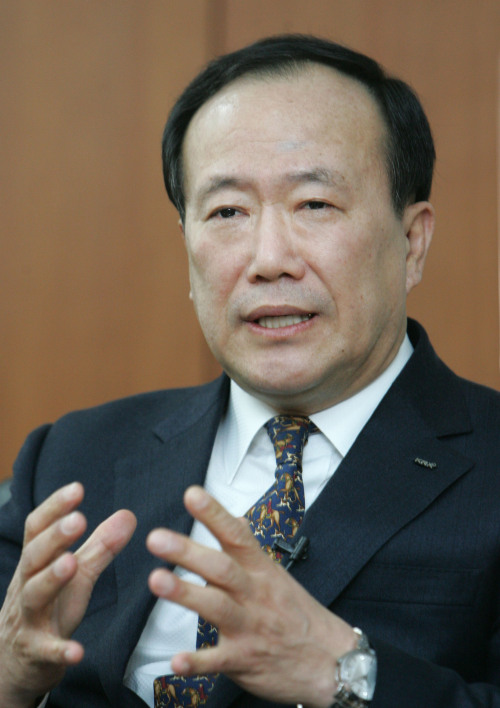Chairman Kim vows to enhance global networking, toughen against fraud
The Korea Exchange will push for an initial public offering to boost its competitiveness and expand its operations globally, its chairman Kim Bong-soo said.
He also pledged to toughen penalties on trading irregularities, citing the recent controversy involving Deutsche Bank, which allegedly manipulated the stock market through massive derivatives trading.
In an interview on Sunday, Kim warned that the unlisted Seoul bourse risks being left behind in a sweeping industry consolidation around the world.
The KRX, currently the world’s 13th-largest, could be reduced to “only a small exchange in Asia” if it fails to follow a global trend toward the economies of scale.
“We need to devise strategies to grow large to cope with the rapidly changing global environment. Going big will strengthen our competitiveness in international negotiations,” Kim said in a group interview Sunday.
He stressed the urgency of its IPO to secure capital and expand trade linkages and alliance with overseas bourses.
The Korea Exchange will push for an initial public offering to boost its competitiveness and expand its operations globally, its chairman Kim Bong-soo said.
He also pledged to toughen penalties on trading irregularities, citing the recent controversy involving Deutsche Bank, which allegedly manipulated the stock market through massive derivatives trading.
In an interview on Sunday, Kim warned that the unlisted Seoul bourse risks being left behind in a sweeping industry consolidation around the world.
The KRX, currently the world’s 13th-largest, could be reduced to “only a small exchange in Asia” if it fails to follow a global trend toward the economies of scale.
“We need to devise strategies to grow large to cope with the rapidly changing global environment. Going big will strengthen our competitiveness in international negotiations,” Kim said in a group interview Sunday.
He stressed the urgency of its IPO to secure capital and expand trade linkages and alliance with overseas bourses.

“Most of our major competitors completed their IPOs and as far as I know, the Japanese exchange is also preparing for one. Only KRX is off the global current,” he said.
The Korean exchange, owned by 28 local securities firms, began to push for a share sale in 2003. But the plan was suspended in 2009 when it was designated by the government as a public organization.
“An unlisted exchange should undergo a valuation process that takes months every time it seeks a merger and acquisition, share exchange, or cross trading with other exchanges,” he said.
“Its IPO is not an issue only concerned with the KRX. The global competitiveness of Korea’s overall capital market is at stake and it is time that all KRX members should consider the issue in earnest,” he said.
He said the KRX planned to expand its cross-border trading with Eurex, futures exchange in Europe, to other major benchmarks to amplify its liquidity pools.
The agreement signed between the KRX and Eurex on March 10 allows local shares to be traded on the European futures market in a real-time basis.
“Investors will feel that the world is a single market in less than five years. The KRX is actively looking into introducing real-time cross border trading with bourses in countries such Brazil, Turkey and Japan,” Kim said.
When the KRX inks cross-border trade agreements with its Brazilian counterpart, local investors will be able to invest in South American stocks during the after-hours of the Seoul market.
The stock operator will also pursue an equity-stake alliance with major exchanges in consolidation.
The comments came as three major mergers representing more than 40 percent of the world’s traded stocks have spurred an industry shake-up on a global scale, increasing competition for bourses.
The planned merger of Germany’s Deutsche Boerse AG and U.S.’s NYSE Euronext valued at about $9.53 billion will make the world’s biggest trading board and deprive the KRX of the status as the world’s most actively traded derivative market.
The KRX is the world’s No. 1 derivative market responsible for about 16 percent of trade volume worldwide.
London Stock Exchange announced a $3.1 billion takeover of Toronto Exchange. Singapore is bidding to merge with Australia’s stock exchange for $7.8 billion. The chief of the KRX said the bourse can become only a small- or medium sized exchange in Asia as it is isolated from the regrouping of global exchanges.
Kim said he plans to meet with his Tokyo and Shanghai counterparts this year to discuss establishment of cross trading partnerships in the region.
“The first to tackle (for cross trading partnership) is Asia since Asian cities are in a similar time zone which would save us setup costs. We will pursue the alliance with American and Brazilian exchanges next,” Kim said.
Kim also highlighted the importance of listing more foreign blue-chips. A list of multinational companies to cross list in the KOSPI has already been brainstormed, he said. Cross listing allows firms to go public in addition to their debut on a domestic exchange.
“The listing of healthy companies leads to a competitive bourse,” Kim said.
“If more global blue chips are listed, more overseas investors will flock to the Seoul bourse and domestic investors will earn opportunities to invest in competitive companies.”
He also defended the KRX’s decision last Friday to fine nearly $1 million on Deutsche’ Seoul unit for failing to make notification on time about its massive derivative trades on Nov. 11 which caused the market tumble and earned it huge gains.
“It disrupted the market order with irregular trading. It should be treated rigorously,” he said.
He said the KRX will consider introducing measures to punish fraudulent trading more sternly.
By Cynthia J. Kim (cynthiak@heraldcorp.com)


















![[Today’s K-pop] Treasure to publish magazine for debut anniversary](http://res.heraldm.com/phpwas/restmb_idxmake.php?idx=642&simg=/content/image/2024/07/26/20240726050551_0.jpg&u=)